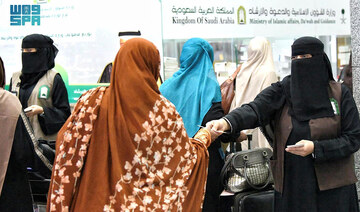KARACHI: Controversies about net-metering and imposition of a new tax have cast a cloud over Pakistan’s transition to solar energy despite the government’s ambitious plans, stakeholders said on Monday, adding the situation has left them in a state of uncertainty.
Pakistan approved the net-metering policy in 2017 that allows consumers to sell excess electricity produced by their solar systems to power distribution companies, resulting in significant savings in their monthly bills.
However, the energy ministry stirred a controversy last month by declaring that net-metering was promoting “unhealthy investments” in installation of solar power by affluent domestic and industrial consumers, hinting at cutting the buyback rates.
“Before this [controversy], people were shifting to solar [energy] in such a way that we thought that 100 percent Pakistan embraced solar energy,” Zulfiqar Ali, an importer, supplier and installer of solar panels, told Arab News on Monday.
“Now, we’re witnessing a stark contrast, a slowdown in inquiries, stagnation in projects, all amidst a talk of governmental reconsideration of solar energy policies.”
Ali said the net-metering issue had a lot of effect on the market as the purchasing groups suddenly went silent and the deals that were going on became stagnant. “The planned projects have gone into an idle position, people are neither saying yes nor no,” he added.
Recent reports published by local media about new taxes and an end to net-metering policy further compounded the situation and prompted Energy Minister Awais Leghari to explain the government’s position on the matter.
“We completely reject these stories. The agreements our companies have made with net-metering users, whether they are for five years, six years, or seven years, will not be altered in any way and the government will not damage its reputation, nor will it cause any inconvenience to those investors,” Leghari said at a press conference in Lahore on Sunday.
He said the government was fully committed to renewable energy and solarization and was in favor of continuing the net-metering policy.
“If, after studying it over the next few months, there is a need to revise it, it will be done very responsibly and in consultation with stakeholders,” Leghari said.
“After the approval of the entire government, if necessary, we will rationalize this. At this moment, we are committed to fulfilling all the contracts we have signed with various people. We will uphold the integrity of the entire government and move forward together.”
But despite the government’s assurances, an atmosphere of uncertainty prevails in the South Asian country with regard to solarization.
“I wanted to install solar panels at my rooftop to mitigate the impact of high electricity bills but now I am unable to take a decision because of the government’s intended moves of either taxing panels or curtailing net-metering benefits,” said Khalid Abbas, a resident of Karachi, adding that he would wait for clarity on the subject.
Solar panel suppliers said people, who were buying solar panels by selling their cars or jewelry, had stopped purchasing the equipment.
“Residential consumers who wanted to install 5-20KW panels have stopped and are waiting for clarity,” Zulfiqar said.
Pakistan’s energy woes stem from the substantially high electricity bills, mainly due to the capacity charges that are as high as 65 percent and the nation is bound to pay these to power producers, even though their plants stand idle.
The power purchase price (PPP), or the average per unit price based on the generation cost, is Rs20.60, which includes Rs14.09 capacity charges, and Rs6.21 fuel and variable charges, according to Pakistan’s reference tariff for fiscal year 2023-2024.
Pakistani energy experts believe the volume with which solar energy is increasing is still “insignificant” and does not even make 1 percent of the total power generation in the country.
“But the way it is going on in Pakistan, perhaps a significant portion of our net-metering will be done from it,” Dr. Khalid Waleed, an expert on energy economics, told Arab News. “Around 2,000MWs will be coming from net-metering. So, it should not be discouraged at all.”
When consumers switch to solar power, Waleed said, capacity charges are borne by other consumers that ultimately increases their power burden.
Experts say the country won’t be able to get rid of the capacity charges before 2050 due to long-term contracts made with power producers.



















